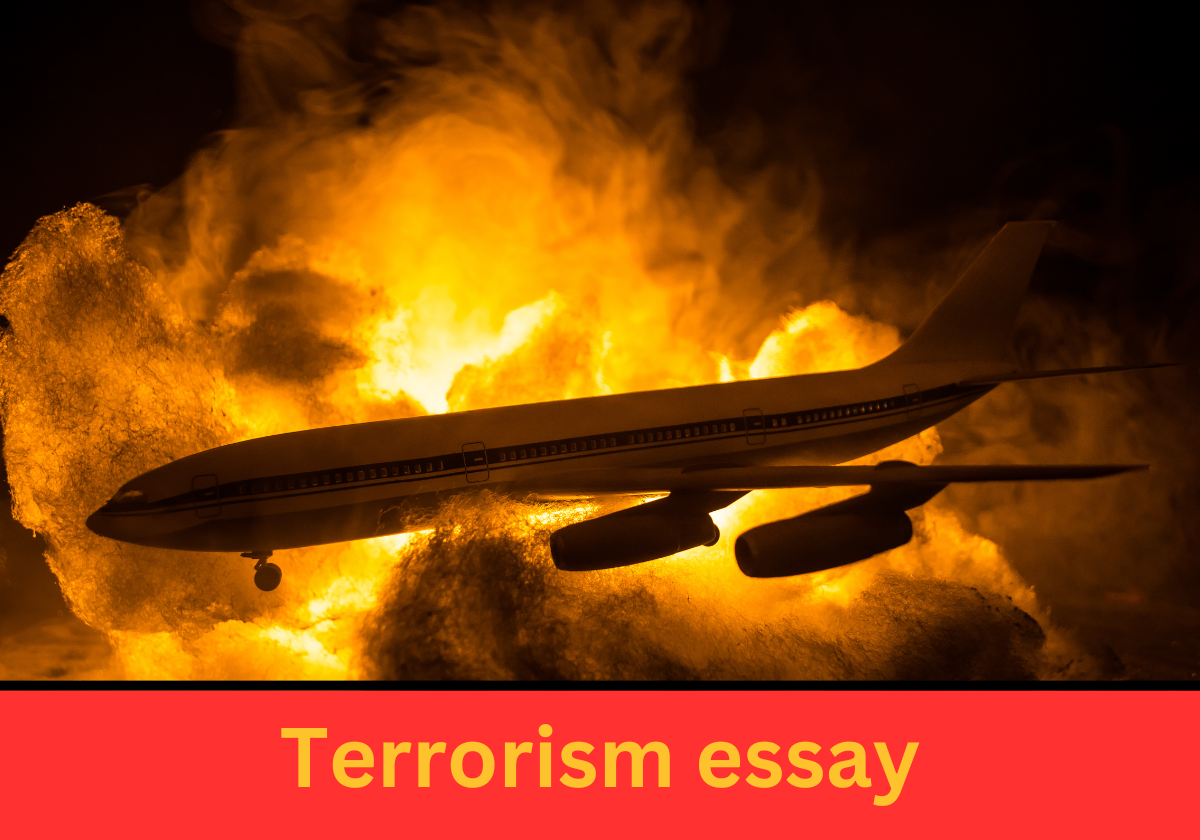A Global Challenge and Its Implications in Society Terrorism is undoubtedly one of today’s greatest problems. It has marked its deadly signature in all parts of the world causing devastation, trauma and grief. The international act of terrorism cannot be narrowed to a single concept as it involves political, social, economic and religious dimensions. This essay sets out to consider the origins and consequences of terrorism and its effects on our society and our world. We will also consider other terrorist groups and their impact while assessing how terrorism helps to shape the state of relations between countries and the essence of the world in the years to come.
The Meaning and Significance of Terrorism: Quite simply put, the use of unlawful violence and intimidation, especially against civilians, in pursuit of political aims is called terrorism. Depending on each terrorist, however, the goals of such acts might slightly differ. However, terrorism usually aims to instil fear into society, promote the collapse of a government, or change certain social aspects for a political or ideological cause. There is no location, religion or ideology where terrorism does not exist. It is an international issue, which affects countries, societies and individuals.
Contributing Factors of Terrorism:
Terrorism is a perpetual problem that has a wide range of reasons specifically related to one’s nation-state, historical, religious, sociocultural, economic and geopolitical status making it an issue that is never singular in concern. This state of affairs is a result of several factors among which include the following;
Political Irrationality and Outrage: Many terrorist groups rise in areas where a political system and governance is weak, corrupt or repressive as it is the case in a host of African countries. The masses despise authoritarian governments or political turmoil in society, giving rise to terrorist ideologies. Resistance without democratic institutions and the rule of law is expressed through violent extremism when individuals turn to that option.
Religious and Ideological Extremism
For certain extremists, the use of indiscriminate violence against civilians can be explained solely with the aid of a religious doctrine or an ideology. The goal is always to justify their wickedness using religion or political ideas. Sooner or later, some prophecies setting up parameters for human civilization and world order or promising heaven compel an individual to forsake the normal perception of life and seek radical solutions. Al Qaeda and ISIS are known for such reasoning, claiming to act in the name of Islam when attacking civilians.
Inequality in Wealth and Poverty
Terrorism has its factors, economic deprivation, poverty and social inequality are some of the most prevalent ones. Most marginalized societies when brought under one leadership will be determined to bring destruction to the current administration, and because of this, terrorism or such acts are committed. In such areas where employment is a problem, particularly among the youth, that is where they get easy recruits for global terror groups through financial support, an ideology and a community.
Globalization and the Growth of the Internet: In the century of globalization, almost instant access to news and wide exposure to social media has accelerated the radicalization of individuals. Armed extremist groups use the Internet as a platform to spread propaganda, enlist recruits, and lend support for attacks. The very essence of terrorism, its international character, and its geographical basis are tending to blur national boundaries and create new problems for states and their enforcing authorities.
Historical Grievances and Conflicts
Terrorism in itself is very complex and multifaceted, but there is one factor that stands out, and that is history, Many terrorist organizations come into existence out of hatred. It is easy for terrorism to flourish in ethnic religious or land disputes that have existed and festered over the years. A war for freedom, or one for self-governance often results in terrorism if dialogues are seen as unfair or under just.
World Terrorism:
Terrorism is not limited to a particular area, rather it is a worldwide phenomenon. Terrorism has taken root in the Middle East, Europe, Asia and America. In recent decades the following organizations have come to be recognized as terrorists:
Al Qaeda
One of the most cruel terrorist organizations on earth. Al Qaeda was headed by Osama bin Laden until the latter was assassinated in 2011. Among the numerous attacks the group engaged in were those including the spark that started the global war on terror known as the September 11 attacks. Their goal was to create an Islamic caliphate and fight against Westernization in the Islamic world.
ISIS (Islamic State of Iraq and Syria)
Next to it is the better-known ISIS which broke out of al-Qaeda in Iraq. As a result of their tried teachings, mass executions, enslavement, and destruction of heritage sites gain irs its notoriety. The Ultimate Objective is to set up a worldwide caliphate under Their interpretation of sharia law which is sewn into every fabric of life.
Taliban
The Taliban, which has its basis in Afghanistan, has also contributed to the terrorism landscape. The movement controlled Afghanistan between 1996 and 2001 and established dominance once more after the U.S. withdrawal from the region in 2021. The Taliban continues to violate the human rights of women, as well as commit violence against other minorities, all under their strict interpretation of Islam.
Boko Haram
In West Africa, Boko Haram has remorselessly made communities in Nigeria, Chad and other states within its reach miserable. The name of the group’s formation translates to “Western education is forbidden” and expresses their aversion towards Western civilization and any form of secular governance as well. Gunmen and bombings are among the abduction tactics frequently employed by Boko Haram.
ETA (Euskadi Ta Askatasuna):
In Europe, the separatist Basque ETA is distinct in that they employed a range of bombings and assassinations of state officials in their campaigns in Spain and France. ETA’s objective was to create a nation of the Basque population and in looks rings a political bell as they resorted to violence to further their cause.
All of these different groups claim to have common goals, which in any case require the use of violence and instilling fear. The idea behind terrorism, however, is different for each unit which ensures that it is by no means a singular entity.
Impacts of Terrorism:
When one takes into consideration the past decades, the facts surrounding terrorism become evident. Apart from the immediate death of people and the fear towards a nation, terrorism has far-reaching impacts.
Life and Psychosocial History
Loss of life is the most dire consequence of terrorism. These attacks are aimed to be emotionally and psychologically traumatizing, to raise the degree of fear in society to cause psychological impact even to children across generations. Children and civilians often have their childhood cut off as anxiety, fear and trauma compels them to change their personality.
Geopolitical Disorder
By weaponizing information, fear and mistrust become the norm within regions where terrorist activities exist. Governments even in developed nations do not comprehend the difference between a normal citizen and a potentially abusive citizen which leads to interference in one’s privacy and geo-statistics disruption on a cross-country level. Domestically, an invasion of sorts is provoked regarding the political inclinations of a country.
Socio-Economic Costs
Not only the developed but the developing nations too struggle to tackle the outbreak of terrorist groups, the cost of rebuilding infrastructure and providing civil security amounts to billions. Terrorism usually disrupts economic and trade activities in regions prone to terrorism, due to which even these rare opportunities for trade become sources of conflict. Such acts even tend to slow the transformation of a society that is struggling with already existing problems.
Displacement and Refugees
As a result of terrorism, there has been a widespread movement of people in search of safety. Fleeing violence has resulted in the benefactor being consensually termed as a refugee. Refugees face miserable conditions either in camps or during the journey towards safety. The refugee crisis is now an added factor of uncertainty and a huge burden on neighbouring states.
Erosion of Social Fabric
Terrorism is also responsible for disintegrating the social fabric. Communities are living in fear and suspicion, and ethnic or religious divides are often intensified. In societies where terrorism is rampant, individuals may become suspicious of their neighbors which in turn leads to increased sectarian conflict and violence.
Terrorism and Its Consequences: The determination for achieving terrorism is purely political, and as any political action, it affects every strata of society. It is not just the victims that have to suffer but the society as a whole. Action must be taken to address the effects of terrorism together with the lack of any action. It is essential to do so through a multi-prong approach that would target the key issues that foster terrorism, and offer aid for the victims of terrorism and international terrorist activities.
Impact on Global Relations
Terrorism’s long reach is linked with cross-border relations and diplomacy. For instance, terrorism-affected states may appeal to other countries for military, monetary or even humanitarian assistance. Diplomatic relations may be strained further, and even conflict arise, where there are different opinions among nations on how to deal with terrorism. American involvement known as ‘The War on Terror’ in countries like Afghanistan and Iraq, in the aftermath of the terror attacks, is a clear-cut case where warfare changed relations among nations.
National Security and Counterterrorism
Faced with the violent extremism many countries have had to fortify their security mechanisms and approach policy frameworks. Toward that end, there are intelligence agencies, military forces, and law enforcement agencies mandated with the responsibility to counter terrorist attacks. Some measures focusing on counter-terrorism activities are surveillance, border control, and engaging with law enforcement agencies abroad.
Human Rights Concerns
As governments are actively fighting this violent extremism, they are very careful and mindful to not cross the hate speech barrier and minimize violent rhetoric. For example, National security and human rights are not mutually exclusive concepts and the focus on enhancing one means compromising the other. Some all too common perspectives stress the need to use force against terrorism and in the process, civic rights and civil liberty restrictions, result in animosity and provoke cycles of violence and more terrorism.
Conclusion:
Terrorism is a social ailment that affects and continues to pose new challenges for people and governments across the globe. The reasons for terrorism are numerous- poor political rule, ideology, economics, history, and even geography. The damage caused is almost irrevocable and its repercussions linger within people, societies and countries. The international sphere must act in concert to combat the underlying factors, without encroaching on fundamental freedoms. A mutual effort and a shared comprehension among the populace is a plausible solution! Such attempts, it is hoped will assist nations in ameliorating the effects of terrorism and creating a more peaceful world for all Americans.

